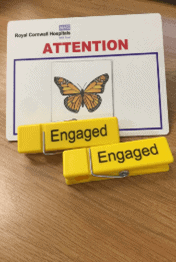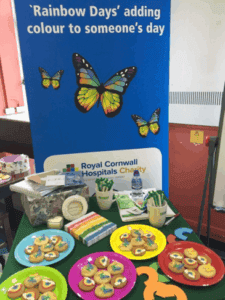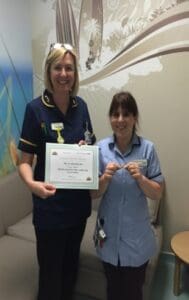`Butterfly Cornwall` A Scheme to Enhance End of Life Care for Patients and their Loved Ones
Royal Cornwall Hospitals NHS Trust

Contact: Elizabeth Thomas – elizabeth.thomas26@nhs.net
Organisation
The Royal Cornwall Hospitals Trust Treliske Hospital is located in Truro, Cornwall.
Royal Cornwall Hospitals NHS Trust (RCHT) is the main provider of acute hospital and specialist services for the majority of the population of Cornwall and the Isles of Scilly, approximately 450,000 people. The population we serve can more than doubles during busy holiday periods. The Trust employs approximately 5,000 staff.
We deliver care from three main sites – Royal Cornwall Hospital, Truro; St Michael’s Hospital, Hayle; and West Cornwall Hospital, Penzance – as well as providing outpatient, maternity and clinical imaging services at community hospitals and other locations across Cornwall & the Isles of Scilly.
General
The Royal Cornwall Hospital Trust `Butterfly Cornwall ` is an innovative initiative to improve the way patients and their loved ones spend their last day’s together .The Scheme is led by the Trust’s Specialist Palliative and End of Life Care (SPEOL) team.
The scheme acts as an enabler for quality at the end of life. It aims to enable all staff to provide equitable care and compassion for patients and their families who die in our care. The scheme helps staff provide extra support when required such as offering refreshments, keeping noise to a minimum and checking if relatives or carers need additional support. The outcomes being improving support and communication to patients /relatives at end of life and enabling staff to gain confidence in caring for patients at end of life.
The sustainability of the scheme will be ensured by a further twelve-month project post to continue to embed the scheme and will be linked to the Trusts ‘Ward Accreditation Scheme’. Financially the scheme has support from the Trust’s Charitable Funds Committee, League of Friends and Macmillan.
The scheme itself is a model that can be easily adapted for use in other settings. There are plans to roll out the scheme in the community hospitals in the County this year.
Rationale
The aim of the initiative is to empower staff with the required skills and confidence to care for patients approaching end of life and their relatives. Encouraging communication and identifying what is important to the patient. The initiative was developed as the team realised that often the needs of the relative were overlooked with a variation in what wards were offering in the form of support. Similar schemes have been implemented in other areas with success.
The butterfly is the symbol for end of life care in the Trust and appears on the Trust’s End of Life paperwork.
Butterfly magnets and stickers along with yellow `dignity clips` were funded by the Hospital League of Friends. The magnets are placed on the door or above the bed of the patient that is approaching end of life to identify to staff that sensitive conversations may be taking place, to be aware of noise levels and to ensure relatives are offered extra support such as food and drinks. The clips are placed on curtains that may be closed around a bed in a bay to again highlight an end of life situation. Consent is gained from the relative or patient prior to these indicators being used.

A letter is given to the relatives explaining what the scheme entails and what they can expect under the scheme.
The scheme includes, snack boxes, hot drinks, open visiting, parking permits, guest beds, meal vouchers and pet visits. In addition the SPEOL team also have developed :
- Comfort bags ‘which contain the essentials that relatives may forget when they have a loved one admitted suddenly. These contain toothbrush, toothpaste, comb, details of shower facilities, drink, snack etc.
- Butterfly Bags which are for the deceased belongings – these bags aid sensitive communication and are a dignified way of returning belongings.
- Wedding Boxes – containing a picture frame, disposable camera, confetti, bunting, photo album, candle, champagne flutes and wedding card. These are held by the chaplaincy team for end of life weddings.
- Rainbow Days` adding colour to someone’s day has also been introduced as part of the scheme.

This particular aspect of Butterfly Cornwall is supported by the trusts `Charitable Funds` it aims to encourage staff to ask the patient what is important to them. Since the introduction of the scheme we have had ad-hoc gestures by staff such as , providing a favourite tipple, a bacon sandwich and arranging for a cat to visit. We have also facilitated a visit to the beach, a manicure and arranged for a hairdresser to visit. Requests could be as simple as wanting to read a favourite magazine or eat a special meal. The aim of the Rainbow Days initiative is to make the granting of these wishes accessible to more patients highlighting just one of the elements of the holistic approach to care that is already widespread across the hospitals teams. Giving staff permission to `break the rules`. Staff that are nominated for facilitating a Rainbow Day are presented with a rainbow badge and certificate.
- Tea sets for each ward for use for families following bereavement, to add a more personal touch at a difficult time.
- `Comfort Boxes` containing fleece blankets/crochet blankets for patients and `Comfort Bags’ for all areas including the emergency department to optimise comfort for relatives and patients. The blankets are single use and loved ones often take them home as a memory.
- Meal Vouchers for use in the hospital canteen – to enable a break for loved ones
Planning
The scheme was originally planned and led by the Specialist Palliative and End of Life team. The scheme was initially piloted on an acute stroke unit to measure the test of change. The SPEOL team trained 50% of staff in use of the scheme prior to roll-out with ward-based education sessions on how to use the scheme, anticipatory medication guidance and priorities for care paperwork. The education continued until all staff had received the required training. Since the initial pilot of the scheme in August 2018 a twelve-month project post was funded by Macmillan to enable the scheme to be rolled out trust wide by December 2019. Funding for a further twelve months has been applied for from March 2020.
The scheme is also supporting the redecoration of side rooms and quiet rooms throughout the trust. The pilot ward obtained funding for redecoration of a side room to include artwork and new flooring. This work is now completed and remains a dedicated side room for end of life patients. Other wards throughout the trust are following this initiative. The SPEOL team have additionally obtained funding for a guest bed for each ward in the hospital to ensure comfort for relatives staying overnight. The project lead and the SPEOL team maintain supportive visits to ward areas.
Impact
The impact/success of the scheme has been measured and presented in a clinical audit report undertaken by the project lead.
A pre–training questionnaire was given to staff and this was followed up by a post training questionnaire with tick boxes and space to add notes for personal reflection, ideas and comments. Data was collated onto an Excel spreadsheet by ward and then a cumulative sheet for analysis to identify learning and develop future plans for analysis. Five main areas were looked at for the purpose of the audit.
An example of the results of one of the questions:
Do you feel ‘Butterfly Cornwall’ has improved end of life care on your ward?
155 answered this question and 90% feel they can see an improvement in EOL care on their ward. This is really positive as the success of the scheme is reliant on the engagement of staff, so where they can see an improvement they are more likely to continue the practice and maintain the momentum of the scheme. When we looked at the results for individual wards, we can see that some areas (4 of 14 sampled) had 100% ‘yes’ to this question which is fantastic. Ward specific comments for this question are generally positive talking about raised awareness, increased knowledge, better understanding and closer links with specialist palliative care team.
Relevance to Others
`Butterfly Cornwall ` has been presented at the senior nurses meeting for the local community hospitals. The community hospitals plan to roll out Butterfly Cornwall throughout 2020. Resources have already been shared to ensure standards are maintained.
The butterfly magnets have been adopted by the trusts Neo-natal unit for use in end of life situations.
The Wedding Box idea has been utilised by other trusts following interest from the teams twitter page alongside the `Butterfly Bags` for deceased belongings.
A relative shared their poor experience of their loved ones care with Healthwatch. As a result of this a short film highlighting the issues around the case is shown at mandatory training. The concept of `Butterfly Cornwall` was shared with the relative and representatives from Healthwatch who felt the scheme addressed some of the issues raised regarding communication and personalised care.
Standing Out
This initiative is particularly special as it aims solely to improve the support and care we give to patients and relatives approaching end of life in a personalised way. It removes the clinical aspect and focuses on what matters to the patient and family. The acute setting can be a difficult place to implement personalised care at end of life, however there are many patients that remain in hospital for the last few days of life and the scheme aims to ensure effective communication between patients and carers and ensure that the needs of both are met at a difficult time.
One of the aspects that have contributed to its success is the simplicity of the scheme. It is easy to use and does not put additional pressure on staff working within the clinical areas. Feedback from staff is that they found it easy to use and it helped them think differently regarding caring for patient/relatives at end of life. Noting that it is often the small things that make the most difference. Feedback collated through an audit of the scheme has evidenced this.
It is also inclusive of all staff working in the ward area including ward clerks, house keepers, nurses, doctors.
This we have found has made non-clinical groups of staff fell more involved and aware of end of life situations on the wards. Taking the education to the ward area enables us to work around the staff during busy periods.
Although there are similar schemes in other areas Butterfly Cornwall has developed its own individual and original initiatives such as `Rainbow Days` a highly successful initiative for staff which makes this scheme stand out from others. Additionally, the team are involved in developing high profile countywide fund raising ideas that promote the scheme and raise awareness nationally. An article regarding the Scheme has appeared in Macmillan Voice and local newspapers.
Key Learning Points
- Keep it simple as staff do not have time for long periods of training
- Take the training to the staff – keep it ward based
- Training certificates and butterfly badges are used an initiative for training completion

Watch the Presentation Here!
